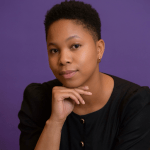Elaine Welteroth first made history when she became the first Black beauty and health director in Condé Nast history. Not long after, she made history again when, at the age of 29, she became the company’s youngest (at the time) editor-in-chief and the second Black person to hold the title in 107 years. After leaving Teen Vogue in 2018, she has further expanded her brand and career. She was recently appointed cultural ambassador for Michelle Obama’s When We All Vote initiative, has written for the hit show “Grown-ish,” and has appeared on-camera for a range of media outlets including her role as a judge on “Project Runway,” and previously, as co-host of CBS’s “The Talk.” In 2019, her debut book “More Than Enough” became an instant NYTimes bestseller, and it went on to receive an NAACP award the following year.
Welteroth, who spoke at Representation Matters, our fourth annual racial equality summit, is an expert when it comes to designing your own career blueprint. Her lessons on leadership, mentorship, advocating for equal pay, taking risks, and the power in showing up as your authentic self in your career are especially important:
Embracing your identity as a catalyst for change
Elaine Welteroth: I first saw my name and my race make headlines when I became beauty and health director at Teen Vogue. That was a defining moment for me. I realized, no matter how hard I chased this cookie-cutter image of what an esteemed editor looks like, talks like, the kinds of stories they write about, and how they show up — I was put here to do things differently because I am innately different from everyone who’s ever done this before. For me to disguise my difference would be detrimental to the audience I was put there to represent. That was the moment that changed my relationship to all of the things that made me feel like an outsider, insecure, and intimidated.
I’d spent a lot of my early life and early career trying to fit in, unsuccessfully. When I embraced all of the things that make me different that was the beginning of realizing how I can make a difference.
As a journalist and editor, your point of view is influenced a lot by your identity and your lived experience, and your point of view works to your advantage. Trying to divorce those things never made sense to me. There’s no way to do your work in the world and not integrate what matters most to you. Especially as a leader. If you are privileged enough to have a seat at a table, it comes with the responsibility to advocate for the interests of those that you represent. The changes that were reflected at Teen Vogue were influenced by the times as much as they were the identity and interests of the editors. I think we all felt that we couldn’t survive as a publication for young people and not acknowledge their intersectional identities and that their human rights were at stake during that election cycle and beyond. It felt like the absolute right thing to do.
Creating diverse teams to better serve your audience
EW: As a leader, you need a team that is diverse enough to reflect the interest of everyone in your broader audience or customer base. While you, as an individual, do not need to reflect the diversity of the world and you won’t deeply understand the complex issues facing every kind of community — it is your responsibility to hire for your blind spots by making sure your team is reflective of the world. Having people from different backgrounds so you can learn from one another is a benefit to the world and the work. As it enables you to connect with your audience on a deeper level so that you can serve them more effectively.
It’s about identifying who your key advisors are going to be, making sure it’s intergenerational — your peers, people who are older than you, and people who are younger than you — and making sure you are contributing as much to that support system as you are expecting to get from it.
Mentorship is a two-way street
EW: Mentorship, sisterhood, and community have been my anchor and my north star. So many Black women have poured into me, and I would not be where I am without them. I still look to them for guidance and support. It’s really, it’s about identifying who your key advisors are going to be, making sure it’s intergenerational — your peers, people who are older than you, and people who are younger than you — and making sure you are contributing as much to that support system as you are expecting to get from it. It’s not just top down.
We are building a world that we’ve never seen before, so the people who’ve come before us have a lot of gems, but they don’t have all the answers. The people who are coming up behind us have insights and instincts that are less encumbered by some of the generational attitudes and beliefs that have held women and marginalized folks back for a long time. So not only is it refreshing to be mentored by the next generation — it’s also essential.
Equal pay and advocating for yourself
EW: Advocate for yourself. Document your wins and present them in order to get what you’re worth. I still am shocked when I hear women who sit in the same company for years and only take the bare minimum. They’re waiting for their employer to notice all of their great work and to compensate them for it. This is your encouragement, to raise your hand and ask.
When advocating for yourself, it’s helpful to have what I call a floor and a ceiling — the ceiling being the number you’re reaching for, and the floor is what you’re comfortable walking away from the negotiation table for. And never allow anyone to force you to make a decision about a job on the spot. Always take the night to think about it.
We have so far to go to reach pay equity, as Black women. And we are still learning, no matter what stage of the game you are in, you are still a work in progress on this topic. We’re still catching up, so I think it’s important to share the tools and the tips that we pick up as we go and know that it is still an incomplete playbook. We are still revising and adding to it every year, and we need all women participating in this conversation in order to overcome this deficit that we find ourselves in.
Diversifying your skillset and designing your career
EW: Because I saw Harriette Cole [my mentor] carve out space for herself in media that she uniquely owned, I believed it could be possible for me. That speaks to how important representation is, and how important it is to find people who genuinely inspire you. Because it’s more than just work, it’s a way of life that resonates and allows you the freedom to craft your own blueprint. I hope other people feel inspired to feel that same kind of freedom when they’re designing their careers. To not feel stuck in any particular space or in any one job title, and to remember that this is yours to create. This is yours to design and to have fun with. To allow your passions and what makes you feel alive guide that journey.
“This [career] is yours to design and to have fun with. To allow your passions and what makes you feel alive guide that journey.”
Feel the fear and do it anyway
EW: A lot of people think fear is an alarm that goes off when you’re heading in the wrong direction, but it could be quite the opposite sometimes. It means you’re at the tip of the iceberg of the next big life-changing decision that you must make if you want to continue to grow. I often refer to a lesson that was handed down to me from one of my mentors, Ava DuVernay. As I was transitioning out of my magazine editor career into my editor afterlife, she helped me reframe my relationship to fear. She asked me if I felt afraid. I said, “Yeah, big time.” She said, “Good.” It made me recognize that if we’re able to recontextualize fear, we can find it to be motivating versus paralyzing.
Life is going to continue to challenge you. It’s going to continue to stretch you. If you are interested in continual growth, you will confront fear again and again on your journey. So, the sooner you redefine your relationship to fear and begin to dance in the face of it, then the easier your transitions will be. The more comfortable you’ll get with change and transformation and reinvention, which is all part of your journey.
Commit To Equality
At Salesforce, we are committed to driving equality in our workplace as we foster a culture where employees feel valued and empowered to succeed.
































